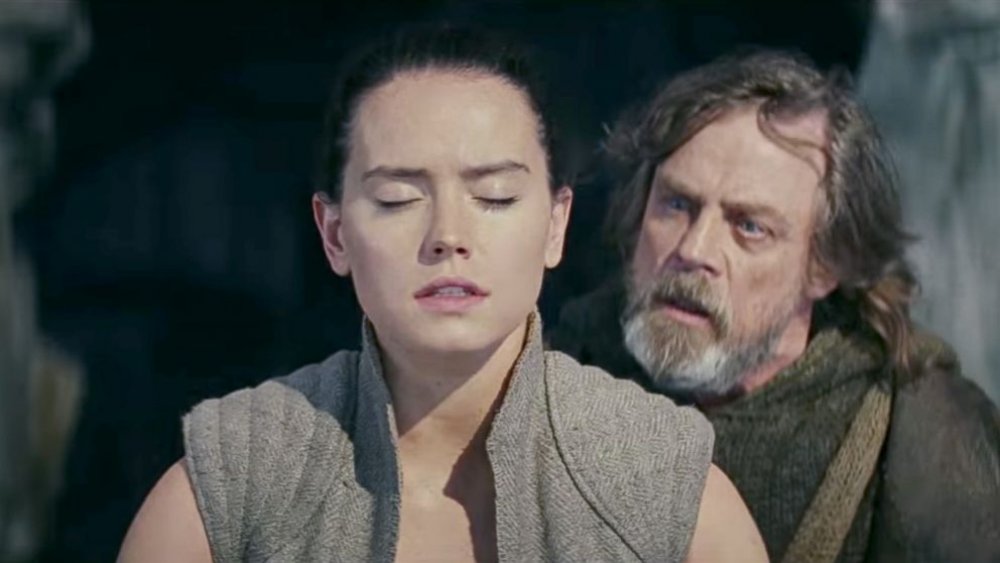Star Wars Director Rian Johnson Says Trying To Satisfy Fans Is A Mistake
Contains spoilers for The Rise of Skywalker
It's been a tumultuous two years in the Star Wars fandom following the release of writer-director Rian Johnson's The Last Jedi. The second entry into the Star Wars sequel trilogy, Johnson's film came after director J.J. Abrams' franchise-reinvigorating effort The Force Awakens, and made narrative choices some felt were delightfully daring and others felt left an irremovable stain on the entire franchise. Abrams returned to the director's seat for the trilogy-capping flick The Rise of Skywalker, which also closes out the nine-movie Skywalker saga that Star Wars creator George Lucas began in 1977, and was faced with the unenviable task of trying to create a movie that would please both sides of the divided fanbase.
Unfortunately, the final result of that undertaking has only pushed fans further apart, as the reviews for The Rise of Skywalker are decidedly mixed. Many critics have argued that the film suffers because of Abrams' evident desire to satisfy fans — and those reviewers seemingly have a supporter in none other than Rian Johnson himself.
The filmmaker recently appeared on an episode of the Radio.com podcast Swings & Mrs. (via Den of Geek), during which he said that making any type of movie (Star Wars or otherwise) with the primary goal of satisfying fans one way or another is a big mistake that would likely yield a negative outcome.
"I think approaching any creative process with [satisfying the fandom] would be a mistake that would lead to probably the exact opposite result," said Johnson, who noted that he was "not writing to anyone's theories or even reactions to The Force Awakens" while he was writing the first draft of The Last Jedi. "Even my experience as a fan, you know, if I'm coming into something, even if it's something that I think I want, if I see exactly what I think I want on the screen, it's like, 'Oh, okay.' It might make me smile and make me feel neutral about the thing and I won't really think about it afterwards, but that's not really going to satisfy me."
Johnson further explained that the reason why he loved Star Wars so much as a child was because the films subverted expectations and encouraged emotional reactions, which is precisely what he aimed to do with The Last Jedi and what he feels all films should strive to accomplish. "I want to be shocked, I want to be surprised, I want to be thrown off-guard, I want to have things recontextualized, I want to be challenged as a fan when I sit down in the theater," he shared.
Some people are disappointed with the fan service in The Rise of Skywalker
The Rise of Skywalker featured plenty of twists, turns, and surprising take-backs, but they didn't pan out perfectly with everyone — and they certainly didn't subvert expectations in the way that Johnson so appreciates. (We're about to enter spoiler territory while touching on the events of The Rise of Skywalker, so please turn back now if you won't want to be spoiled.)
At various points in The Rise of Skywalker, the story kills off characters and brings them back just a few minutes later, drops major bombshells vis-à-vis parentage and true identity (without providing all that much backing), sees characters make bold choices regarding where they stand on the light and dark sides of the Force, and even features at the end of the movie a kiss between two characters fans have been rooting for since The Force Awakens. Many of these moments reflect exactly what Star Wars diehards were hoping would happen in the film, which has people believing that Abrams genuinely set out to make The Rise of Skywalker a movie only certain fans would enjoy.
Critics have speculated — somewhat jokingly, somewhat in earnest — that Abrams may have read through Reddit forums and scrolled around on Twitter to see what the vocal majority of Star Wars fans wanted out of The Rise of Skywalker, and then did just that alongside co-writer Chris Terrio. Even more noted in their reviews of the film that the apparent focus on satisfying fans had the inverse effect: revealing Rey's true bloodline, walking back lore presented in The Last Jedi, giving one character a redemption arc, and popping in a bit of romance at the end did indeed please some fans, but it also left a sour taste in the mouths of others who felt that the film was bogged down by so much fan service. As TIME Magazine's Stephanie Zacarek argued, "[The Rise of Skywalker] is for everybody and nobody, a movie that's sometimes reasonably entertaining but that mostly feels reverse-engineered to ensure that the feathers of the Star Wars purists remain unruffled. In its anxiety not to offend, it comes off more like fanfiction than the creation of actual professional filmmakers."
Whether or not Abrams and the folks at Disney and Lucasfilm made satisfying fans the top priority going into The Rise of Skywalker, the fact of the matter is that the film did do exactly that. Unfortunately, it came at the cost of disappointing other fans. But such is the name of the filmmaking game: if you please one side of a fandom, you're probably going to upset the other. You simply can't satisfy everyone, and the Disney-Lucasfilm gang has surely learned that lesson with the Star Wars sequel trilogy.

